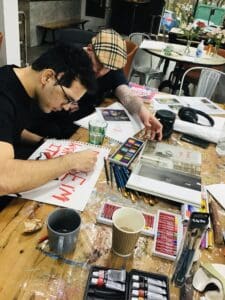Earlier this year, Max Carr joined the team at STEPS as our very first Art Psychotherapist. He supports our clients by building supporting therapeutic relationships, to provide a safe space for each client to reflect on any emotional difficulties and concerns.
In this short article, we discuss Art Therapy and its benefits as part of a rehabilitation programme.
What is Art Therapy?
Art Therapy or Art Psychotherapy is a recognised and effective mental health treatment, which uses psychodynamic or person-centred counselling methods alongside art and art making as a pre-verbal tool of communication.
Art therapy uses the process of creating art as a tool to treat mental health and improve emotional wellbeing. Techniques can include painting, drawing, and sculpting, with a client talking to their therapist as they create art beside them.
Art therapists provide a safe, compassionate, and creative environment, allowing the client to express their difficulties. These sessions can be done as 1-2-1 sessions but can also be done as part of a wider group-session.
Art Therapy and Neurological Rehabilitation
We have created a unique environment at STEPS, which enables clients to access a range of therapies and facilities all under one roof, from consultants in rehabilitation medicine, physiotherapists to art therapists.
When a person has suffered a debilitating injury or illness, the impact is often wide-ranging on a person’s physical and mental health, and our inter-disciplinary approach allows our team to work collaboratively to provide an intensive rehabilitation care package.
Art therapy sessions can be a powerful tool to help a client identify and address the emotional impact and the thoughts and feelings and behavioural changes they experience following a traumatic accident, injury, or illness.
By supporting a client’s emotional recovery, they often feel more engaged with the physical therapies which can enhance the outcomes of their overall rehabilitation journey and goals.
As a pre-verbal form of therapy, art therapy also gives clients a voice and a means of sharing their emotions and feelings without the need to speak.
Benefits of Art Therapy
- Pre-verbal form of communication
- Enjoyable
- Improves cognitive abilities
- Improve fine motor skills
- Can help to express anger
- Can help to experience grief
- Can relieve depression
- Can help to treat PTSD
- Improve Self-Esteem
- Improve Motivation
- Encourage acceptance
- Supports and improves the outcomes of rehabilitation
For more information on Art Therapy, please visit our therapies page here.
Wellbeing Art Hub
Our clients love being creative at STEPS, and our wellbeing team are dedicated to running sessions and activities that enrich their time with us during their rehabilitation journey.

Creativity and art sessions can be hugely beneficial and often compliments other therapies, playing a key role in an individual’s overall rehabilitation journey, which is why our wellbeing team at STEPS have introduced an ‘Art Hub’ to their timetable of additional activities for our clients.
